- Share this article
- Subscribe to our newsletter
A tailwind for Africa’s agri-food systems transformation
“The future of agri-food systems in Africa: innovative approaches to solve current challenges.” Under this motto, the German-African Business Association (Afrika-Verein der deutschen Wirtschaft) and the German Agribusiness alliance invited existing and potential business partners, ministers of agriculture, representatives from farmers' organisations, development practitioners and scientists to the 10thGerman-African Agribusiness Forum in Berlin/Germany in late January.
Agricultural Policy Dialogue for more resilience
Collaboration with Africa was one of the priorities in his Ministry, Germany’s Federal Minister of Food and Agriculture, Cem Özdemir, stressed at the opening of the event. Özdemir referred to the example of the Agricultural Policy Dialogue, launched by his Ministry and the African Union last November – “the only collaborative scheme in the agricultural and food sector of the German Federal Government and the European Union respectively with the African Union”, the Minister explained. Guided by the notion of agroecology, it is to help reduce one-sided dependence on imports and enhance food security and food sovereignty on the continent. Creating sustainable and resilient value chains and the strengthening of intra-African trade is to boost local supplies of safe and nutritious food; in addition, new export options are to be tapped to promote economic development.
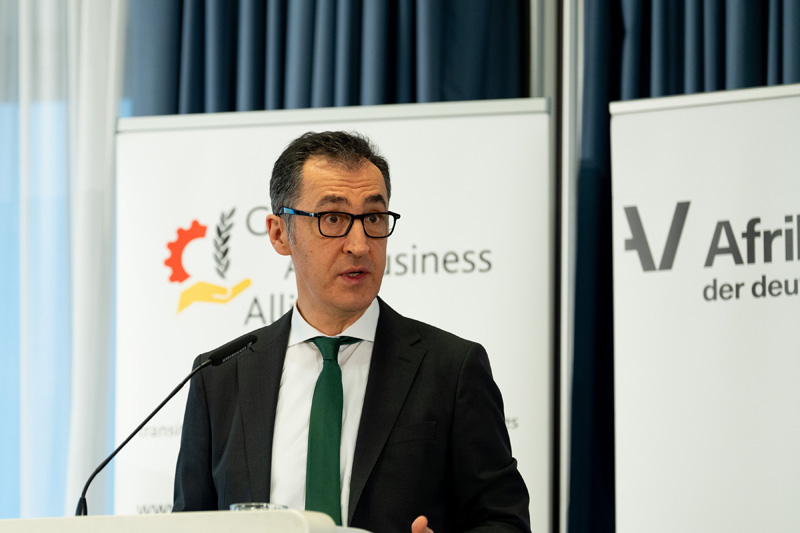
Cem Özdemir, Germany's Federal Minister of Food and Agriculture. Photo: Afrika-Verein/ Joshua Meeko
Two crucial “i”s: infrastructure and inclusivity
Africa’s population is predicted to reach 2.4 billion by 2050, while the net import bill for food is projected to grow to 50 million. Supporting science and research was crucial to reducing this import bill, said Josepha Sacko, Commissioner for Agriculture and Rural Development at the AU Commission. Here, embracing cutting-edge technology could help. However, in addition to the potential of digital solutions, rural infrastructure, and here, in particular, electrification, must not be forgotten. “Rural development is core for achieving the digitalisation of rural areas,” Sacko stressed. Capacity-building of farmers was just as crucial to sustainable development as inclusivity. Therefore, gender equality should be at the centre of the post-Malabo Action Plan which is currently being developed by the AU, Sacko maintained. And: “We have to respect indigenous knowledge and build upon it so that we can innovate.”
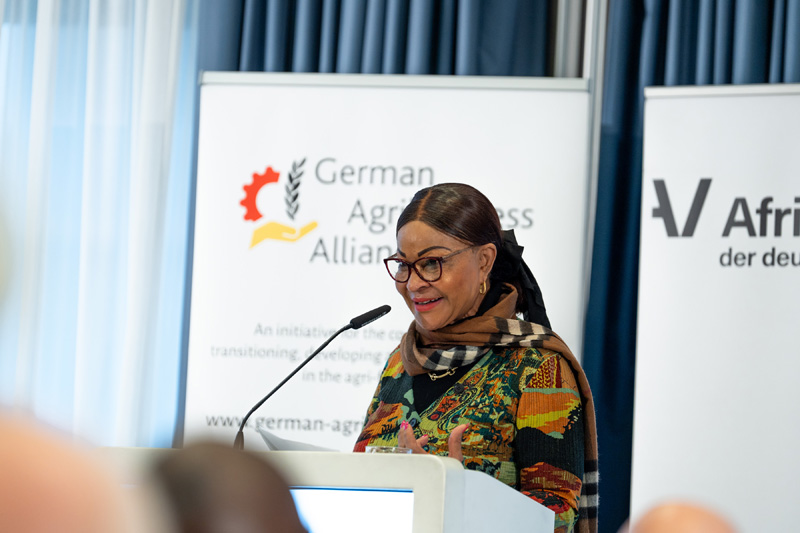
Josefa Sacko, AU Commissioner for Agriculture, Rural Development, Blue Economy and Sustainable Environment.
Photo: Afrika-Verein/ Joshua Meeko
How do the skills get to the farmers?
Innovations, however, aren’t no-brainers. In order to become effective, they need an enabling environment – as well as the necessary knowhow among the users. “As long as we don’t bring the educational systems in these countries to the farmers, we won’t achieve anything,”, Ralf Schlauderer, Head of HSWT International School of Germany’s University of Applied Sciences Weihenstephan-Triesdorf, insisted. For traditional sectors to be changed, long-term partnerships were needed. The HSWT has established such partnerships with higher education institutions in Ethiopia, Kenya, Uganda, Togo and Senegal, in order to hand on its knowledge about agricultural education there. Schlauderer sees one major shortcoming here in only very few institutions having associated training farms on which knowledge is passed on to the farmers – on a lasting basis, and not just for a few days or weeks a year. For he is convinced that “training of farmers is a national task. It is a task of the universities together with farmers’ organisations.” Industry can offer support here, Schlauderer maintains.
Protective clothing for women, too
Thavy Staal, Senior Product Stewardship Manager, Agricultural Solutions at BASF gave an account of such support. It reaches from agronomic or sales advice sent via SMS or other messaging services to the farmers to mobile agricultural clinics, which are based on containers transported to the farms. “What we see across Africa is a lack of awareness about safety,” Staal noted, referring to one of the biggest problems. As part of the company’s Global PPE Initiative (PPE stands for personal protective equipment), farmer safety was of utmost importance, she said. BASF is working closely with many stakeholders including pesticide regulators, experts from university and intergovernmental organisations and industry scientists under the ICPPE (International Center for PPE at the University of Maryland Eastern Shore) Initiative. In Kenya, the group is developing a coverall design striking a balance between protection, comfort and cost. For the extremely high temperatures are often the reason for the farmers’ not wearing protective clothing. In April, the first ISO 27065 garment developed together with the farmers is to be brought on the market. In addition, there are plans to expand to South Africa and develop corresponding protective clothing for women who do not wear trousers for cultural reasons. “Safety should be engrained in DNA and become a standard in agricultural training,” Staal insists.
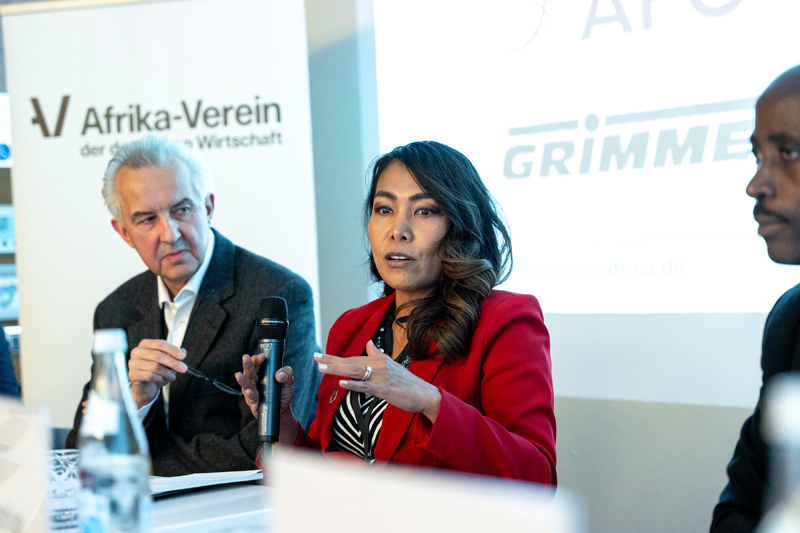
Thavy Staal, Senior Product Stewardship Manager, Agricultural Solutions, BASF SE. Photo: Afrika-Verein/ Joshua Meeko
The power of collaboration
It was training that Hastings Nhlane told a story of which at first didn’t sound encouraging. This young man from Malawi really wanted to become an engineer, for as a son of farmers, he viewed farming as synonymous with poverty. Even so, he enrolled at a university of agriculture and, at the age of 21, opted for carrying on with his parents’ profession. This was a tricky venture, for he was pushed out of his parent’s land. So he went back to the city, starting to produce with a tiny piece of rented land – and with a modest result. Other young farmers in the district didn’t fare any better, and then they joined forces – which proved a success. “Already in the first year, profits multiplied, news of which spread through the community like wildfire,” Nhlane recalled.
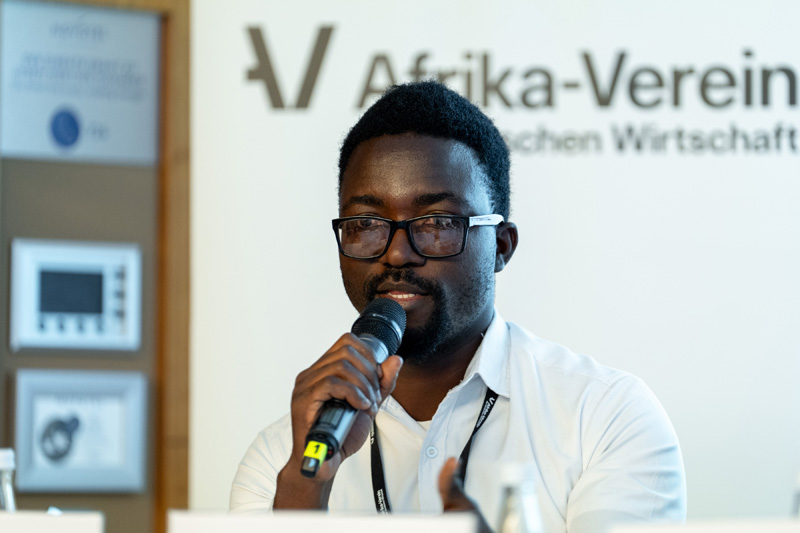
Hasting Nhlane, Founder and CEO of Acades, Malawi. Photo: Afrika-Verein/ Joshua Meeko
Countering the mismatch of knowledge
What was the biggest obstacle this young entrepreneur faced entering his profession? Alongside a lack of access to land and secure tenure, financing and resources, above all, a mismatch of knowledge. “At the university, I hadn’t learnt how to start a business, how to make a business plan, that I need to pay taxes and all the other requirements an entrepreneur has to meet,” Nhlane explained. But even in the field of technology, he had to learn everything from scratch, for his training had been almost exclusively theoretical. Today, ten years later, he doesn’t perceive many changes. He says that most young people still don’t know that agriculture is profitable, noting that there are no platforms to acquire the skills needed, and that the young farmers themselves aren’t sufficiently organised. This is precisely what he addresses with his social business Acades: access to information (via agribusiness clubs in which farmers are organised), finance (via microfinance loans) and resources (via partnerships with seed companies and drip irrigation kits). And skills development, of course.
Silvia Richter, editor, Rural 21
Further reading:
Rural 21 issue 03/2023: Joining forces for agri-food systems transformation
Rural 21 issue 02/2023: Agrifood prices, food security and the role of trade
Rural 21, issue 1/2021: The challenge of innovation
Rural 21, issue 3/2017: Tapping the potential of rural youth


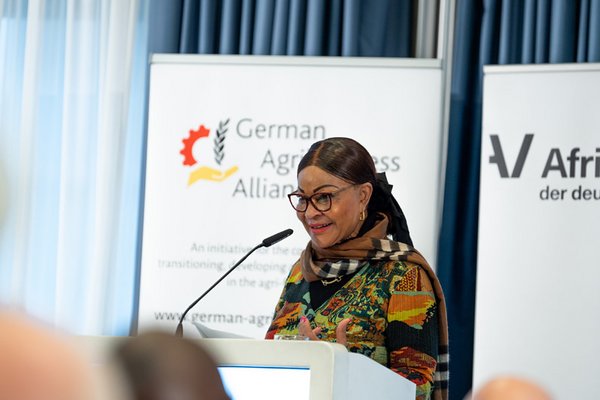


Add a comment
Be the First to Comment